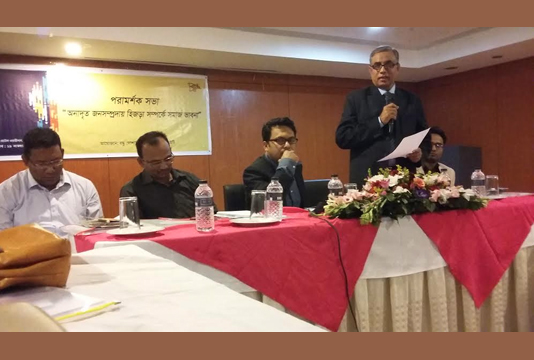RAJSHAHI, Nov 19, 2018 (BSS) – Speakers at a consultation meeting here
today called for ensuring fundamental rights especially the health, social
and legal rights of the transgender people for uplifting their living
standard for the sake of inclusive development of the country.
They said the society, as a whole, should come forward with positive
attitude toward the extreme socially excluded people for their coexistence in
society.
Bandhu Social Welfare Society (BSWS) organized the discussion titled “SDG
Attainment through Inclusive Development: Social Integration of 3rd Gender
and Institutional Responsibilities” at Hotel Warishan in Rajshahi city.
Chief Medical Officer of Rajshahi University Dr Tabibur Rahman Sheikh
addressed the meeting as chief guest while Additional Deputy Commissioner Abu
Hayat Rahmatullah and Deputy Civil Surgeon Dr Barnabaj Hashda spoke as
special guests.
City Social Service Officer Md Ashikuzzaman, Director of Barendra Unnayan
Prochesta Foyzullah Chowdhury, President of Diner Alo Hizra Sangha Miss Mohna
and its General Secretary Sagarika Khan also spoke.
Taking part in the discussion, teachers, Kamal Pasha and Golam Faruque
Sarker, from Department of Anthropology in Rajshahi University, disseminated
their expertise on the issue.
In her concept paper presentation, Umme Farhana Zarif Kanta, Programme
Manager of BSWS, highlighted the activities of the organization for elevating
the living and livelihood condition of transgender people in the country.
She pointed out that the members of the community are always subjected to
negligence and repression in every sphere of life including family and
society. Hijra community is deprived of several rights, she added.
Dr Tabibur Sheikh said the present government is very much positive
towards solving the problems of the hijra community. He urged the people to
change their attitude towards the transgender people and demanded quota for
them in education and job sectors.
He said general people have a very narrow mindset regarding genderless
people and they should change their mentality.
Being rejected by families, many grew up hating their bodies and fall
victim to depression, drug addiction, violence and suicide, he added.
Around 2.5 percent people of the total population were genderless, Dr
Tabibur said, adding that they are deprived of their basic rights.
Representatives of various government and non-government entities
concerned attended the meeting took part in its open discussion.



